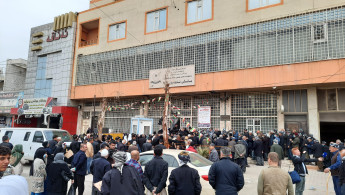Iraqi Kurdistan government workers say delayed salaries mean no Eid Al-Fitr
Iraq's Kurdistan Regional Government (KRG) has yet to pay its current and retired employees ahead of Eid Al-Fitr, the Muslim holiday that marks the end of Ramadan.
As of Thursday, thousands of employees from the KRG ministries of higher education, culture, municipalities and electricity are yet to be paid salaries for March.
In contrast, the Iraqi central government in Baghdad is up to date on its payments, currently giving its employees and pensioners their salaries for May.
"I will not celebrate Eid Al-Fitr as I am not being paid a March salary and thus cannot buy food and clothes for my kids," a woman employed by the culture ministry told Kurdish broadcaster NRT.
The KRG, which has governed Iraqi Kurdistan since 1992, exports more than 500,000 barrels of oil per day and says it now plans to export its gas to Turkey and European countries.
But the ruling parties that make up the coalition government, which includes the Kurdistan Democratic Party (KDP), the Patriotic Union of Kurdistan (PUK), and the Change Movement (Gorran), have accused each other of "stealing" public money.
KRG Finance Minister and Gorran member Awat Sheikh Janab participated in this week's meeting of the KRG Council of Ministers after he previously boycotted the meetings and threatened to resign over the salary delays.
"Awat Sheikh Janab returned to perform his duties after he met with top leaders of PUK and KDP, who assured him they would not create obstacles for his ministry... but the issues and the political interference in the financial affairs are ongoing, as we can see," a source from Gorran told The New Arab on condition of anonymity.
"The issue behind delays in paying the civil servants of several KRG ministries in Sulaymaniyah city is that the ruling parties are stealing public revenue for themselves."
Although the Kurdistan region officially has one government, the region is in reality split between rival factions in the major cities of Erbil and Sulaimaniyah.
The KDP has near-absolute power in Erbil, while the PUK and Gorran run Sulaimaniyah together.
"According to a recent deal between Masrour Barzani, the KRG PM, and his deputy, Qubad Talabani, each province should contribute to paying all those on the public payroll using local income,” the Gorran source said.
But the Kurdistan Parliament's financial committee chief and PUK member Zyad Jabbar said the government could pay salaries using money from oil exports alone.
"In the past, our pretext for distributing salaries late was we did not have money," Jabbar said.
"But the financial conditions in the Kurdistan region now allow for the KRG to pay its civil servants regularly [just] using oil export income since the price of oil is high," Jabbar said, adding that parliament is putting pressure on the KRG to pay the salaries.
Judicial authorities in the Iraqi Kurdistan region are set to free a 35-year-old mother of five held without charge for over 16 months.https://t.co/XonfmBLg8b
— The New Arab (@The_NewArab) April 18, 2022
Last month, four elderly KRG retirees died while waiting to be paid their delayed pensions.
The New Arab contacted KRG spokesperson Jotyar Adil to ask him about the salary delays, but he was not immediately available for comment.





 Follow the Middle East's top stories in English at The New Arab on Google News
Follow the Middle East's top stories in English at The New Arab on Google News


